Filter by
749 results found
-
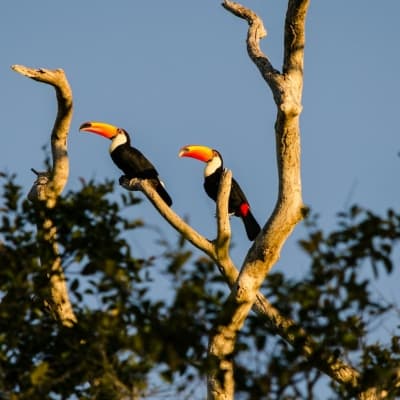
The cross-boundary impact of EU’s carbon dioxide removal strategy in Brazil
In a recent publication, NbSI’s Aline Soterroni and collaborators took a a close look at the European Union’s (EU) Carbon Dioxide Removal (CDR) strategy and its implications beyond EU borders, particularly in Brazil. The study, published in a broader work on European climate policy, raises important questions about the environmental and social impacts of CDR […] -

Reimagining land use in climate pledges: a call for high ambition
In the new climate guide from the Land Gap Report, the focus is squarely on rethinking how land use is integrated into Nationally Determined Contributions (NDCs). NDCs are the national climate action plans underpinning global efforts to meet the goals of the Paris Agreement. However, the authors argue that the initial rounds of NDCs often […] -
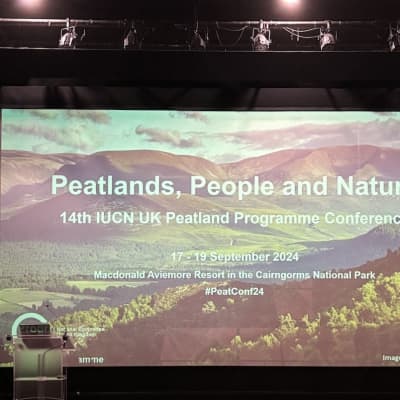
New study shows that peatland restoration can provide a climate benefit at all timescales
NbSI present work at international peatland conference, including a case study that demonstrates the climate benefits of peatland restoration in the UK. -
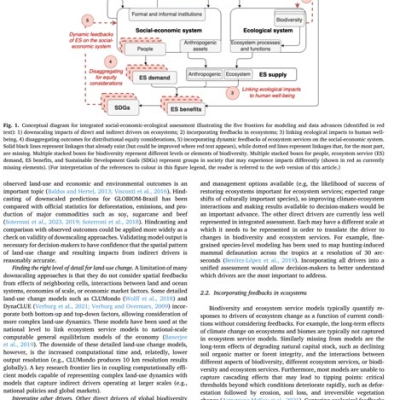
Integrated modeling of nature’s role in human well-being: A research agenda
We identify five research frontiers for integrated social-economic-ecological modeling (primarily focused on terrestrial systems) to incorporate biodiversity and ecosystem services: 1) downscaling impacts of direct and indirect drivers on ecosystems; 2) incorporating feedbacks in ecosystems; 3) linking ecological impacts to human well-being, 4) disaggregating outcomes for distributional equity considerations, and 5) incorporating dynamic feedbacks of ecosystem services on the social-economic system. -

NbSI Director receives Marsh Award for Ecology
We are delighted to announce that our founding director, Professor Nathalie Seddon, has been awarded the Marsh Award for Ecology by the British Ecological Society. -

Warm welcome to new team members
NbSI welcomes newcomers, bringing exciting new research directions. We are delighted to introduce Dr Jennifer Lucey as Deputy Director of NbSI. -
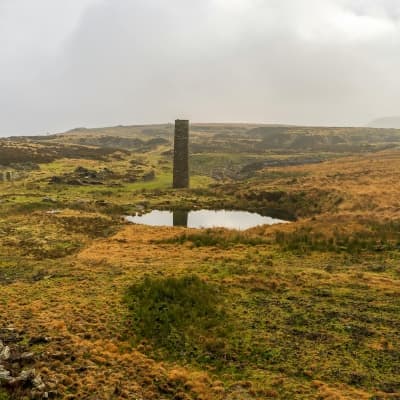
Overlooked potential of peatland restoration
Ongoing work by the Nature-based Solutions Initiative’s John Lynch and Xiao Zhang in collaboration with The Wildlife Trusts, as part of the Agile Initiative, is quantifying the climate benefits of vital peatland restoration work that may have been omitted from official greenhouse gas statistics. -
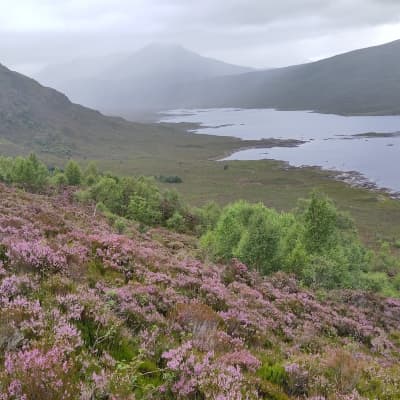
Investigating the importance of soil health for woodland regeneration in the Scottish Highlands
Postdoc Emily Warner, MBiol student Jon Harper, and Research Assistant Thomas Richardson spent six weeks this summer collecting data to explore the relationship between mature trees, regenerating seedlings, and soil in three Caledonian pinewood remnants in Scotland’s West Highlands. -
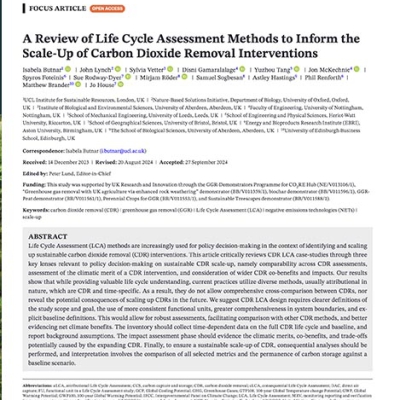
A Review of Life Cycle Assessment Methods to Inform the Scale-Up of Carbon Dioxide Removal Interventions
This article critically reviews CDR LCA case-studies through three key lenses relevant to policy decision-making on sustainable CDR scale-up, namely comparability across CDR assessments, assessment of the climatic merit of a CDR intervention, and consideration of wider CDR co-benefits and impacts. -

A new research agenda for exploring nature’s contribution to wellbeing
Integrated assessment models incorporating biodiversity and ecosystem services can guide sustainable development, but significant gaps hinder timely decision-making. This new study identifies five research priorities to improve these models, focusing on ecosystem impacts, feedbacks, equity, and human well-being. -

Win-wins or trade-offs? Finding the balance in nature-based solutions
A new study finds that there is a need for comprehensive, site-specific planning to leverage the dual potential of NbS for climate mitigation and human wellbeing—moving beyond the "one-size-fits-all" narrative and embracing the complexity of our shared environment. -
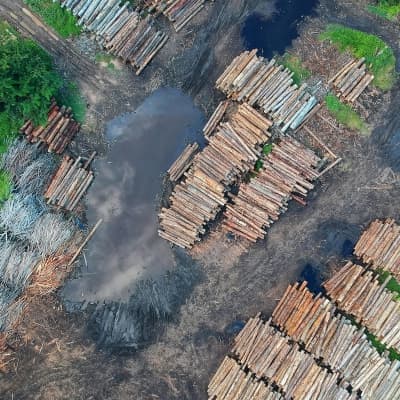
Balancing conservation in the face of a dynamic environment
While logging in tropical forests often leads to habitat degradation and biodiversity loss, research suggests that logged forests can still retain significant ecological value. -

The dangers of framing animals as climate solutions
The concept of using animals as climate solutions has gained momentum in recent years, with rewilding and conservation touted as nature-based ways to mitigate climate change. A recent Nature Climate Change article, titled “Resisting the Carbonization of Animals as Climate Solutions,” challenges this narrative, cautioning against overstating the role of large animals in carbon sequestration. […] -
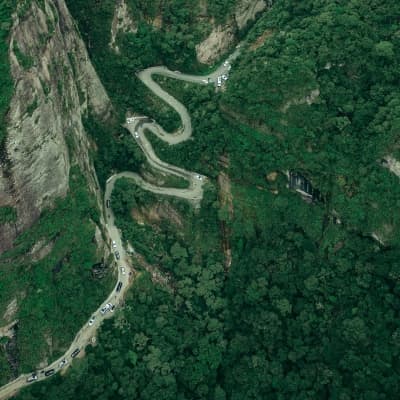
Smallholder farmers and efficient ranching practices critical for Brazil’s Atlantic Forest
The simulation study highlights that supporting smallholder farmers to restore native vegetation on their land would be necessary to reach the ambitious target of restoring 15 million hectares by 2050. -
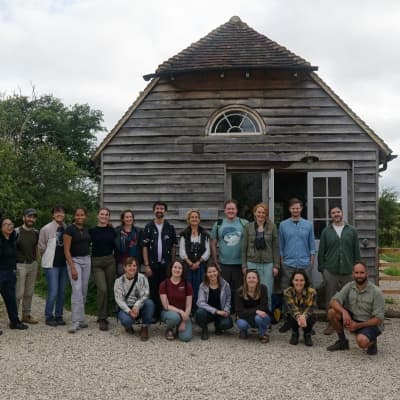
NbSI visits Knepp Rewilding Estate
The NbSI team enjoyed a field trip to Knepp Rewilding Estate, to witness nature restoration in action. -
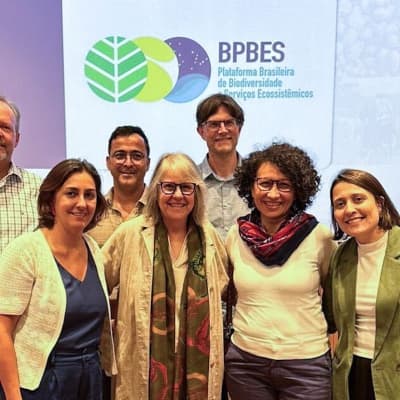
Brazil spotlight on agriculture, biodiversity, and ecosystem services
New study reveals that climate change projections could render large agricultural areas in Brazil unviable by 2060, particularly in the Amazon-Cerrado region, calling for the adoption of more sustainable agricultural models that make better use of natural resources and focus on restoring degraded lands. -
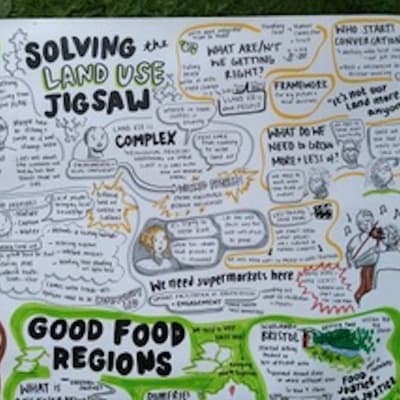
Solving the land-use jigsaw in Scotland: poetry, music, farmers and science
Art, science, farming and nature came together in a tent in a field in Scotland this summer, as NbSI took part in a unique event organised by SEDA Land, the Scottish Ecological Design Association. -

Narratives around nature-based dolutions
A new report finds that Nature-based Solutions (NbS) are now widely viewed as an effective way of helping to address climate adaptation and mitigation, although many are concerned about their misuse in greenwashing and violations of human rights. -

Highlighting the importance of agroforestry for addressing societal challenges at event for the President of Zambia
NbSI’s Lubasi Limweta participated in a panel discussion on climate change at the Rhodes Scholarship event "Standing Up for Zambia", marking Zambia's 60th year of independence. -

Using policy scenarios to assess challenges and opportunities for reaching restoration targets in Brazil’s Atlantic Forest
In this study we simulate the impacts of alternative restoration policies addressing targets for Brazil, and explore their impacts on selected terrestrial species and agricultural development potential in the Atlantic Forest biome. -

How can we manage uncertainties in habitat greenhouse gas emissions?
Estimating emissions and developing mitigation pathways for environmental greenhouse gases presents additional challenges beyond those associated with tracking fossil carbon dioxide (CO2). Firstly, environmental emissions are uncertain and variable in time and space, reflecting the complicated interactions between ecological communities and their physical environment that give rise to emissions. Secondly, environmental greenhouse gas emissions are […] -
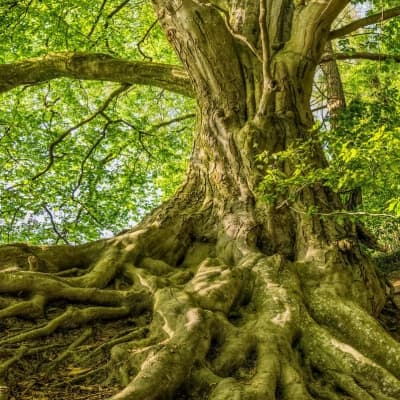
Going beyond carbon essential to appraise Climate Benefits of Nature-based Solutions
Two recent papers, in Science and Nature Communications, highlight how focussing exclusively on this measure can overlook other important details that impact climate. -

Directors’ Duty to Consider Nature
Climate litigation experts suggest that risks posed to corporates by climate litigation are material, increasing and currently unmanaged. -

Does ‘net zero’ mean zero cows?
A significant share of anthropogenic global warming comes from livestock production. There is debate about whether there can be any role for livestock in a climatically sustainable future; the debate is particularly heated for cows and sheep, largely due to the methane they burp out. -

Climate Justice: Creating Compassionate, Equitable, and Actionable Solutions to the Climate Crisis
Join us for a dynamic and thought-provoking panel discussion as we delve into the urgent issue of climate justice and explore pathways towards compassionate, equitable, and actionable solutions to the climate crisis.
